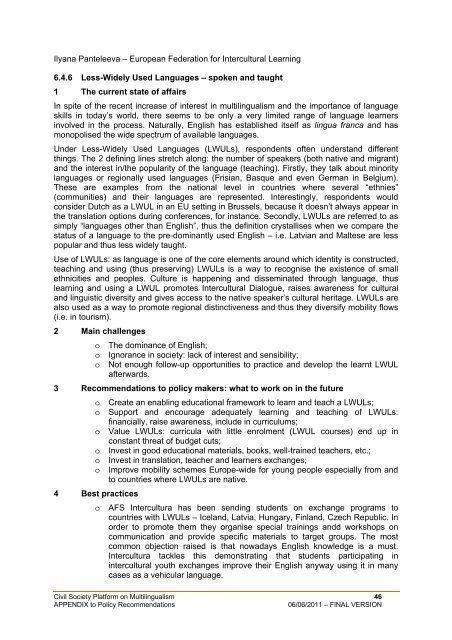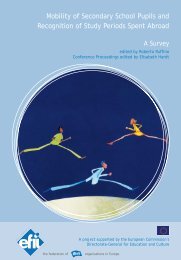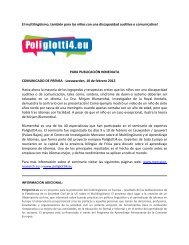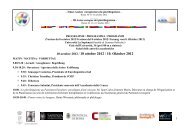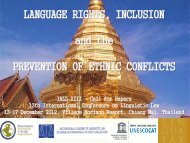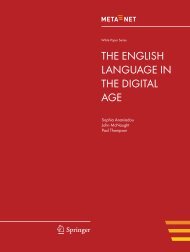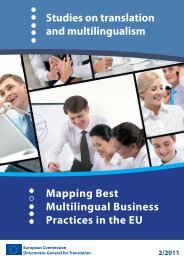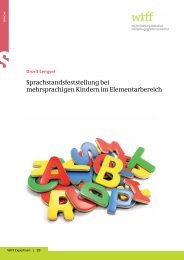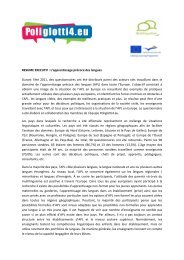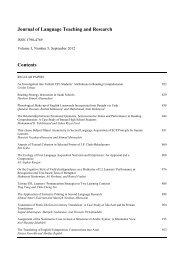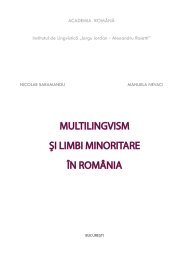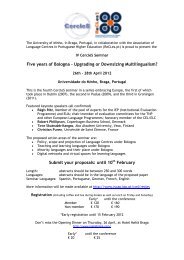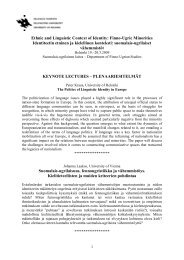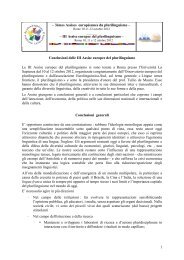FULL VERSION - European Commission - Europa
FULL VERSION - European Commission - Europa
FULL VERSION - European Commission - Europa
You also want an ePaper? Increase the reach of your titles
YUMPU automatically turns print PDFs into web optimized ePapers that Google loves.
Ilyana Panteleeva – <strong>European</strong> Federation for Intercultural Learning6.4.6 Less-Widely Used Languages – spoken and taught1 The current state of affairsIn spite of the recent increase of interest in multilingualism and the importance of languageskills in today’s world, there seems to be only a very limited range of language learnersinvolved in the process. Naturally, English has established itself as lingua franca and hasmonopolised the wide spectrum of available languages.Under Less-Widely Used Languages (LWULs), respondents often understand differentthings. The 2 defining lines stretch along: the number of speakers (both native and migrant)and the interest in/the popularity of the language (teaching). Firstly, they talk about minoritylanguages or regionally used languages (Frisian, Basque and even German in Belgium).These are examples from the national level in countries where several “ethnies”(communities) and their languages are represented. Interestingly, respondents wouldconsider Dutch as a LWUL in an EU setting in Brussels, because it doesn’t always appear inthe translation options during conferences, for instance. Secondly, LWULs are referred to assimply “languages other than English”, thus the definition crystallises when we compare thestatus of a language to the pre-dominantly used English – i.e. Latvian and Maltese are lesspopular and thus less widely taught.Use of LWULs: as language is one of the core elements around which identity is constructed,teaching and using (thus preserving) LWULs is a way to recognise the existence of smallethnicities and peoples. Culture is happening and disseminated through language, thuslearning and using a LWUL promotes Intercultural Dialogue, raises awareness for culturaland linguistic diversity and gives access to the native speaker’s cultural heritage. LWULs arealso used as a way to promote regional distinctiveness and thus they diversify mobility flows(i.e. in tourism).2 Main challengeso The dominance of English;o Ignorance in society: lack of interest and sensibility;o Not enough follow-up opportunities to practice and develop the learnt LWULafterwards.3 Recommendations to policy makers: what to work on in the futureo Create an enabling educational framework to learn and teach a LWULs;o Support and encourage adequately learning and teaching of LWULs:financially, raise awareness, include in curriculums;o Value LWULs: curricula with little enrolment (LWUL courses) end up inconstant threat of budget cuts;o Invest in good educational materials, books, well-trained teachers, etc.;o Invest in translation, teacher and learners exchanges;o Improve mobility schemes Europe-wide for young people especially from andto countries where LWULs are native.4 Best practiceso AFS Intercultura has been sending students on exchange programs tocountries with LWULs – Iceland, Latvia, Hungary, Finland, Czech Republic. Inorder to promote them they organise special trainings andd workshops oncommunication and provide specific materials to target groups. The mostcommon objection raised is that nowadays English knowledge is a must.Intercultura tackles this demonstrating that students participating inintercultural youth exchanges improve their English anyway using it in manycases as a vehicular language.Civil Society Platform on Multilingualism 46APPENDIX to Policy Recommendations06/06/2011 – FINAL <strong>VERSION</strong>


